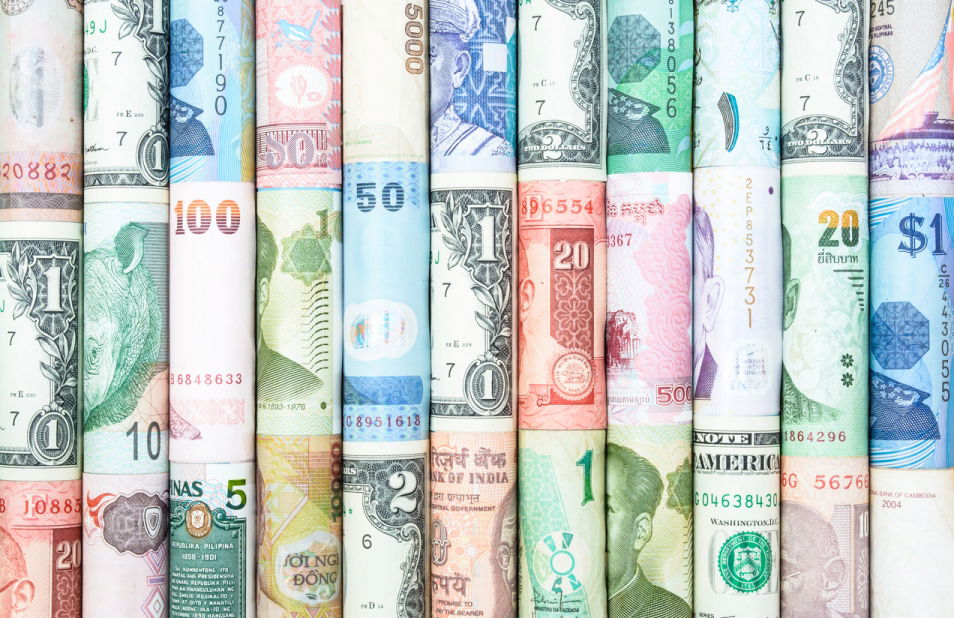Exchanging money is one of the first things most travelers think about before heading overseas. Having cash in the local currency makes it easier to pay for taxis, tips, meals, and small purchases when you first arrive.
While you can swap currency at airport kiosks or hotels, these options often come with high fees and poor exchange rates. Banks and credit unions are usually a safer and more cost-effective choice, especially if you plan ahead.

The catch is that not every financial institution offers the same rates, services, or currencies. Some allow online ordering and home delivery, while others require branch pickup. To help you find the right fit, below is a list of 20 banks and credit unions that make exchanging foreign currency simple and convenient.
How Bank Exchange Rates Work
When banks exchange money, they start with what’s called the interbank rate—the wholesale rate banks use when trading currency with each other. Customers never get this exact rate. Instead, banks add a small margin on top, which becomes the rate you see when buying or selling foreign cash. That’s why rates can look different depending on where you go, even on the same day.
It’s also important to remember that exchange rates move constantly. A rate you see today might be slightly higher or lower tomorrow, which can affect how much money you get when converting larger amounts.
Common Fees to Watch For
On top of exchange rates, banks and credit unions may charge extra fees that affect the total cost of your transaction:
- Currency conversion fee: A percentage added when you exchange one currency for another.
- Delivery fee: A flat charge if you have foreign cash shipped to your home or branch, often waived for larger orders.
- Foreign transaction fee: Banks may charge a foreign transaction fee (usually 1%–3%) when you use your debit or credit card abroad. Choosing a bank with no foreign transaction fees can save money.
- Service fee: Some institutions charge a set fee just for handling the exchange.
Checking both the rate and the fees upfront is the best way to avoid surprises and make sure you’re getting a fair deal.
What to Look For in a Bank That Exchanges Foreign Currency
Not all banks and credit unions handle foreign currency the same way. Before you exchange currency, compare these factors to make sure you’re getting the best value:
- Currency availability: Some banks only carry major currencies like euros or British pounds, while others can order dozens more.
- Exchange rates: Look for rates close to the market rate. Even small differences can add up on larger transactions.
- Fees and charges: Watch for service fees, delivery fees, and conversion fees that increase the total cost.
- Speed and convenience: Some banks let you pick up cash the next business day, while others may take a week.
- Ordering options: Online and mobile ordering with branch pickup or home delivery can save you time.
20 Best Banks and Credit Unions for Foreign Currency Exchange
These banks and credit unions across the U.S. make it easier to get local cash before heading overseas. Each offers different currencies, fees, and ordering methods, so it pays to compare.
1. Chase
Chase Bank offers both home delivery and branch pickup for foreign currency orders. Customers should note that the bank may set daily or per-order limits on how much can be exchanged, which is worth checking before placing a large order.
2. U.S. Bank
U.S. Bank lets customers order foreign currency through its website or mobile app, then pick it up at a chosen branch. In many cases, cash is available the next business day, making it a fast option for last-minute travelers.
3. Bank of America
Bank of America supports more than 70 currencies and gives customers the choice of home delivery or branch pickup. Smaller orders come with a delivery fee, but ordering larger amounts can help you avoid extra costs.
4. Capital One
Capital One stands out for waiving extra currency exchange fees, which helps keep costs predictable. That makes it appealing for travelers who want straightforward pricing without hidden charges.
5. Citi
Citi not only provides foreign currency exchange but also allows certain customers to maintain multi-currency accounts. This feature benefits frequent travelers or business clients who manage funds across different countries. While their rates are generally competitive, it’s smart to compare before making a large exchange.
6. PNC Bank
PNC gives customers access to many foreign currencies and doesn’t tack on extra transaction fees for exchanging cash. Smaller orders do come with a delivery charge, so it’s often better to place a larger order if you want the most value.
7. Citizens Bank
Citizens Bank makes foreign currency ordering straightforward. Customers can request more than 50 major currencies online and then pick up the cash at a nearby branch. It’s a solid option for travelers heading to destinations that use widely circulated currencies.
8. Fifth Third Bank
With access to over 70 different currencies, Fifth Third Bank offers one of the larger selections among regional banks. Customers can order at a branch or online, then collect the currency at a convenient location. The flexibility makes it appealing for families or groups preparing for trips abroad.
9. Wells Fargo
Wells Fargo is one of the few U.S. banks that pairs standard currency exchange with a foreign currency savings account. This allows frequent travelers to hold and manage multiple currencies, in addition to ordering cash online for delivery or pickup.
10. TD Bank
TD Bank supports exchanges in 55 currencies, with the option to order online for home delivery or branch pickup. Customers with TD accounts may also qualify for better rates, which can make a noticeable difference on larger transactions.
11. Truist
Truist provides access to a broad mix of currencies. Orders can be placed online or in person, though some exchanges may come with additional fees. It’s worth asking about costs upfront to avoid surprises.
12. State Employees Credit Union
State Employees provides over 60 currencies and allows members to order online for home delivery. This makes it one of the more convenient credit union options, especially for those who don’t live near a branch.
13. First Horizon Bank
Serving primarily the Southeast, First Horizon Bank offers exchanges in more than 65 currencies. Unlike some national banks, they require customers to visit a branch in person, so it’s best suited for account holders who live within their footprint.
14. Huntington Bank
Huntington Bank provides currency exchange services across its Midwest branch network. While they do not offer as many currency options as the biggest banks, they remain a practical choice for account holders who want the convenience of ordering close to home.
15. America First Credit Union
America First members can exchange up to $5,000 in foreign currency, either in person or by placing an online order ahead of time. While convenient for those who qualify for membership, access may be limited outside their regional branch network.
16. Navy Federal Credit Union
As the largest credit union for military members and their families, Navy Federal offers foreign currency exchange as a member benefit. Their fees are often lower than what you’ll find at commercial banks, though the range of available currencies may be more limited.
17. Regions Bank
Regions Bank customers can order foreign cash through their local branch. While the bank offers a solid mix of currencies, you’ll need to plan ahead since online or home delivery options are not available.
18. Service Federal Credit Union
Service Federal is able to exchange currency for its members. SFCU offers over 60 types of currencies. They also have an online system that allows members to purchase currency and have it delivered to their home, adding a layer of convenience.
19. USAA
Serving military families and veterans, USAA offers a wide selection of currencies for international travel. Their services are designed with members’ mobility in mind, making them a convenient option for those who move or travel frequently.
20. Wings Financial Credit Union
Wings Financial provides access to more than 90 currencies, one of the largest selections among credit unions. Members can place online orders and have the money shipped directly to their home, a useful perk for travelers who want to plan ahead without visiting a branch.
Pro Tips for Exchanging Foreign Currency
A little preparation can make exchanging money much easier and less expensive. Keep these tips in mind before you place your order or head to a branch:
- Order early: Place your order at least a week before your trip to allow for processing and delivery.
- Carry small bills: Having smaller denominations makes it easier to pay for taxis, tips, and other quick expenses.
- Avoid airport kiosks: Exchange rates at airports are often less favorable, so only use them for small, last-minute amounts.
- Check limits: Some banks cap how much you can exchange per order, so verify policies before requesting large amounts.
- Use a no-fee card: Pairing a no foreign transaction fee credit card with cash exchanges can help you avoid unnecessary costs.
Bottom Line
Exchanging foreign currency through a bank or credit union is usually safer and more affordable than relying on airport kiosks or hotels. The best option depends on the currencies you need, how quickly you need them, and whether your bank offers delivery or branch pickup.
Planning ahead is the key to saving money. Compare exchange rates, ask about fees, and order early to make sure you have the right mix of cash before you leave. A little preparation goes a long way toward making your trip smoother and more cost-effective.
Frequently Asked Questions
Can I exchange currency at any bank?
Not all banks and credit unions exchange foreign currency. It’s always a good idea to check with your bank to see if they offer this service.
How long does it take to get foreign currency from a bank?
Turnaround times vary. Large banks may have popular currencies available within one business day, while less common currencies can take up to a week to arrive.
Do banks exchange foreign coins?
Most banks only accept paper bills for exchange. Foreign coins are usually not taken, so it’s best to spend them before returning home or keep them as souvenirs.
Is it cheaper to exchange currency in the U.S. or abroad?
It depends on where you exchange and the fees involved. Ordering from a U.S. bank in advance often gives you more predictable rates, while exchanging abroad may be cheaper in some destinations but riskier if you wait until arrival.
Can I use my debit card in foreign countries?
Yes, you can typically use your debit card internationally. However, you may be subject to a foreign transaction fee and ATM fees. It’s a good idea to check with your bank before you leave to understand any potential charges.
What should I do with unused foreign currency?
Most banks will allow you to exchange your foreign currency back to your home currency. However, not all banks will take coins, and some may only exchange certain currencies.




